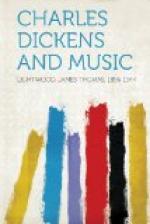On a later occasion, after enjoying some games of cards he retires to rest in a deeply contemplative mood.
‘These rubbers,’ said Mr. Swiveller, putting on his nightcap in exactly the same style as he wore his hat, ’remind me of the matrimonial fireside. Cheggs’s wife plays cribbage; all-fours likewise. She rings the changes on ’em now. From sport to sport they hurry her, to banish her regrets; and when they win a smile from her they think that she forgets—but she don’t.’
Many of Mr. Swiveller’s quotations are from Moore’s Irish Melodies, though he has certainly omitted one which, coming from him, would not have been out of place, viz. ’The time I’ve lost in wooing’!
On another occasion Swiveller recalls some well-known lines when talking to Kit. ’An excellent woman, that mother of yours, Christopher,’ said Mr. Swiveller; ’"Who ran to catch me when I fell, and kissed the place to make it well? My mother."’
This is from Ann Taylor’s nursery song, which has probably been more parodied than any other poem in existence. There is a French version by Madame a Taslie, and it has most likely been translated into other languages.
Dick gives us another touching reference to his mother. He is overcome with curiosity to know in what part of the Brass establishment the Marchioness has her abode.
My mother must have been a very inquisitive woman; I have no doubt I’m marked with a note of interrogation somewhere. My feelings I smother, but thou hast been the cause of this anguish, my—
This last remark is a memory of T.H. Bayly’s celebrated song ‘We met,’ which tells in somewhat incoherent language the story of a maiden who left her true love at the command of her mother, and married for money.
The world may think me gay,
For my feelings
I smother;
Oh thou hast been the
cause
Of this anguish—my
mother.
T. Haynes Bayly was a prominent song-writer some seventy years ago (1797-1839). His most popular ballad was ’I’d be a Butterfly.’ It came out with a coloured title-page, and at once became the rage, in fact, as John Hullah said, ’half musical England was smitten with an overpowering, resistless rage for metempsychosis.’ There were many imitations, such as ‘I’d be a Nightingale’ and ‘I’d be an Antelope.’
Teachers and Composers
Although we read so much about singers, the singing-master is rarely introduced, in fact Mr. M’Choakumchild (H.T.), who ’could teach everything from vocal music to general cosmography,’ almost stands alone. However, in view of the complaints of certain adjudicators about the facial distortions they beheld at musical competitions, it may be well to record Mrs. General’s recipe for giving ‘a pretty form to the lips’ (L.D.).




